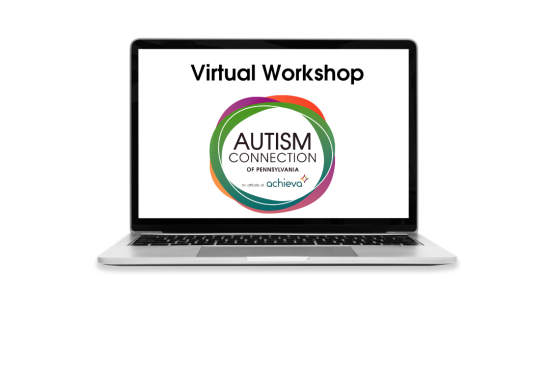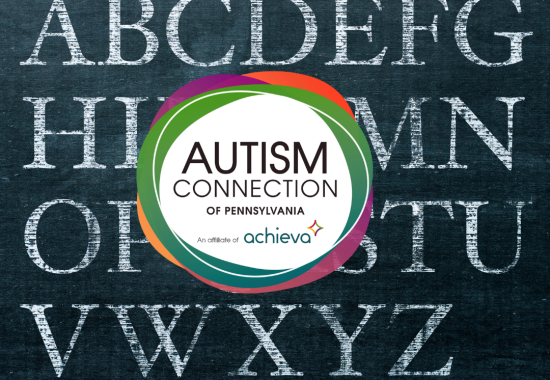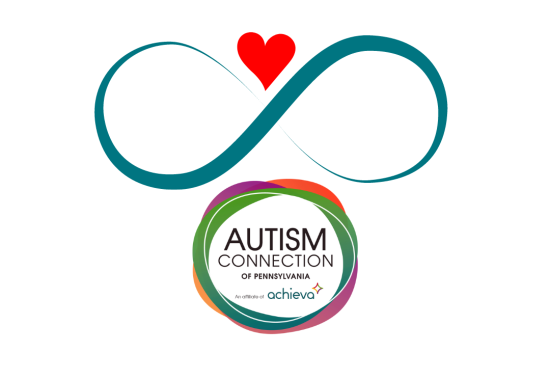Tag: Autism Connection of PA
Introduction to Autism Virtual Workshop
Child Health Association of Sewickley Grant: Spelling
We are glad to share that Autism Connection of Pennsylvania has been granted the opportunity to further our mission of being a lifeline and hub for families and adults in the autism community. With heartfelt gratitude, we announce that we have been awarded a grant of $10,000 by the Child Health Association of Sewickley.
We believe in leaving no member of our community behind. Our organization is disability-led, with a passionate team that includes three autistic board members, and 33% of our staff is autistic. We serve people and families from infancy through older adulthood, with a goal that
everyone receives the support, information, and advocacy they deserve.
This grant is a testament to our commitment to inclusivity and accessibility. With these funds, we will embark on a project aimed at supporting people who are nonspeaking or minimally verbal, hoping to help them communicate their needs and wants—often for the first time.

Here’s a glimpse of what this project entails.
Project Goals
- Link families who have had success with spelling to access academic, social, and healthcare needs
- Engage families in dialogue with newcomers for whom traditional speech and language services are not sufficient
- Emphasize the concept of presuming understanding on the part of nonspeaking autistic young people and promote literacy from a young age
- Educate caregivers about autism brain differences that affect spoken communication
- Encourage families to explore new communication methods with support from experienced practitioners
Measurement of Success:
- Number of new families introduced to spelling for accessing various needs
- Number of families using spelling with some success
- Engagement of professionals in training sessions
- Distribution of spelling boards at no cost
- Involvement of families, teachers, and therapists in implementing spelling
This project aligns with our core values of inclusivity, accessibility, and support. We are dedicated to making a tangible difference in the lives of nonspeaking autistic people and their families, ensuring that communication barriers do not hinder their access to healthcare, education, and social engagement. Together, we can break down barriers and create a more inclusive world for people with autism who need access to communication.
Thank you for being a part of our journey.
Understanding The Connection Between Autism Spectrum Disorder and Cerebral Palsy
April is a time when we come together to recognize the diverse experiences of people living with autism spectrum disorder (ASD) and their families, and we encourage the momentum to continue throughout the year. Autism is a complex neurodevelopmental condition that affects how a person communicates, interacts with others, and experiences the world around them. As we delve into the intricacies of autism, it’s essential to understand its relationship with other conditions, such as cerebral palsy.
The Intersection of Autism and Cerebral Palsy
Cerebral palsy (CP) is a group of neurological disorders that affect movement, posture, and muscle coordination. While CP primarily impacts motor function, it can also co-occur with other developmental conditions, including autism. Research suggests that approximately 6% to 15% of individuals with CP also have a diagnosis of autism, highlighting the overlapping nature of these conditions.
The co-occurrence of autism and cerebral palsy presents unique challenges for each person and their families. Understanding the relationship between these conditions is crucial for providing comprehensive care and support. While the exact mechanisms underlying their co-occurrence are not fully understood, a couple factors may contribute to their association:
Common Risk Factors – Both autism and cerebral palsy have shared risk factors, including genetic predisposition, prenatal complications, and environmental influences.
Neurological Differences – Research suggests that disruptions in brain development may contribute to the development of both conditions. Structural and functional abnormalities in the brain can manifest as diverse symptoms associated with autism and cerebral palsy.
Navigating Dual Diagnoses
Receiving dual diagnoses of autism and cerebral palsy can be overwhelming for individuals and their families. It’s essential to access comprehensive support services and resources to address the unique needs associated with each condition. Here are some steps to navigate this journey:
- Seek Multidisciplinary Care — Collaborate with a team of healthcare professionals, including pediatricians, neurologists, developmental specialists, and therapists, to develop a personalized treatment plan tailored to your child’s needs.
- Access Early Intervention Services — Early intervention is critical for optimizing outcomes for children with autism and cerebral palsy. Explore early intervention programs that offer therapeutic interventions, educational support, and family-centered services.
- Connect with Support Networks — Joining support groups and connecting with other families facing similar challenges can provide invaluable emotional support, practical advice, and shared experiences. Organizations like Autism Connection of PA offer resources and community networks.
Autism Connection of Pennsylvania thanks Jennifer LaRocco, Editor & Coordinator at Cerebral Palsy Guidance, for sharing her expertise through this insightful guest blog post. Jennifer’s contribution sheds light on the intricate relationship between autism spectrum disorder and cerebral palsy. As we commemorate April’s focus on autism, let’s keep the momentum going throughout the year. Thank you, Jennifer, for your dedication to raising awareness and fostering understanding in our community.
Please visit Jennifer’s page on the Cerebral Palsy Guidance website to learn more.
Families Share: The Things that Keep Us Home and The Things that Bring Us Out
Sensory-friendly, inclusive events have become increasingly popular, and in an effort to ensure that all – and we mean all – families feel safe and welcome, we reached out to Astrid Arroyo who often attends events with her son to find out what works for her family. We also spoke with people who choose to stay home to find out why.
The Things that Keep Families Home
Families who have children with complex needs often reach out to Autism Connection looking for resources and support. We noticed that many shy away from large scale sensory friendly events, so we started asking why. One parent shared sensory friendly events aren’t for her teenage son. “They may be inclusive once you’re inside, but really, we just can’t do it. Many people don’t understand the risk going into a busy city really is. Safety is a concern we have to take very seriously.”
Other families share similar barriers:
- Transportation and parking – high stress levels in getting to venues. Parking alone can be overwhelming
- Safety and accessibility – not only do we need to gain access to the venue, we have to make sure there’s a “place” for us. Families that have loved ones who bolt or run quickly have additional concerns.
- Perceived judgement on our loved one’s behavior. Hosts need to be crystal clear that vocalization and movement are welcome and not considered disruptive.
- Venues are too big – can we find welcoming venues on a smaller, quieter scale?
- Inconvenient times – Great. There’s a sensory friendly hour at 9:00am on a Wednesday morning during school and work hours. Thanks.
- Cost – many sensory friendly events are not affordable.
We have to ensure that venues are safe, that staff and volunteers are well trained, accepting and prepared, and that all behaviors are truly welcomed. Smaller, shorter activities may be more appropriate for some families, and not everyone is equipped for long outings. Also, hosts may consider that it can take hours for some families to prepare to leave the house, so scheduling an event in the morning simply won’t work them.
Astrid Shares: The Things that Bring Families Out
When you see Astrid Arroyo, you’re likely to see her son, Kai, active, in the community, and included. We asked her what works for her family.
“For me, the accessibility of the venue and parking are always the main concern. This is the reason I tend to attend events that are outdoors, or in a venue that has outdoor space, and their own parking, or close accessible parking spaces.
We make it work because Kai drives us to it. Kai doesn’t like to stay home at all. He likes to be out surrounded by people, specifically people that are not us. So, I look for as many events as I can that I know he will enjoy, and that I am able to leave him with a staff, or his brother. Sometimes we choose an event big enough that we can watch him from afar.”
Astrid on the Importance of Raising Awareness About Sensory Friendly Events
“Events are not fully communicated to all families that can benefit from them. Not everyone is on social media. Not everyone has the time to go through Facebook or Instagram trying to find events, only to find out the time has passed. Families are overwhelmed 24/7 with the caring of their child, family obligations, doctor appointments, schooling, therapies, work etc. So even with families having access to these events, they forget about them quickly. This is the reason I started my Parent Group to repeatedly post social events that Kai likes, but I fear may go away due to low attendance.
But I wish, honestly, that supports coordinators were made aware of social events and that they would help families with planning to attend them. This applies to adults with aging parents who may not have the energy and patience to take their loved ones to these events.
I would like to find some sort of solution for parents to know what is out there, because events are out there. And people who are willing to host events for our loved ones are out there as well. We just need to figure out what is really needed, how can we make things more accessible to all families, and how can we create more events that are all inclusive.”
Autism Connection thanks Astrid for her insight and for her passion in helping people enjoy life to the fullest. In response, we have created a survey to further identify barriers and to determine what we all can do to help. Whether you’re a parent, friend, autistic adult, professional or other caring person, please take a moment to share your ideas by completing our Sensory Friendly Events Survey or email [email protected].
Empowering Connections: Sophie’s Potluck, A Special Journey
In this uplifting interview with Amy Hart, the driving force behind Sophie’s Potluck, we delve into the story of Sophie, a vibrant 14-year-old on the autism spectrum. Amy shares the inspiration behind starting Sophie’s Potluck and the unique experiences they offer to the community. From the adorable blue peacock logo to the diverse array of activities, this initiative aims to create a supportive and inclusive space for families. Discover how Sophie’s Potluck is fostering connections and providing opportunities for growth.
Tell us a little about Sophie.

Sophie’s signature bow
What drove you to start Sophie’s Potluck?
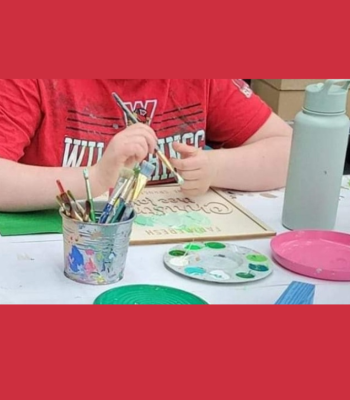
Getting creative

Sophie’s Potluck logo designed by April Watt Little and Cheri Foote
Your logo is an adorable blue peacock cuddled next to a cooking pot. What’s the story behind this image?
What kind of activities do you offer?
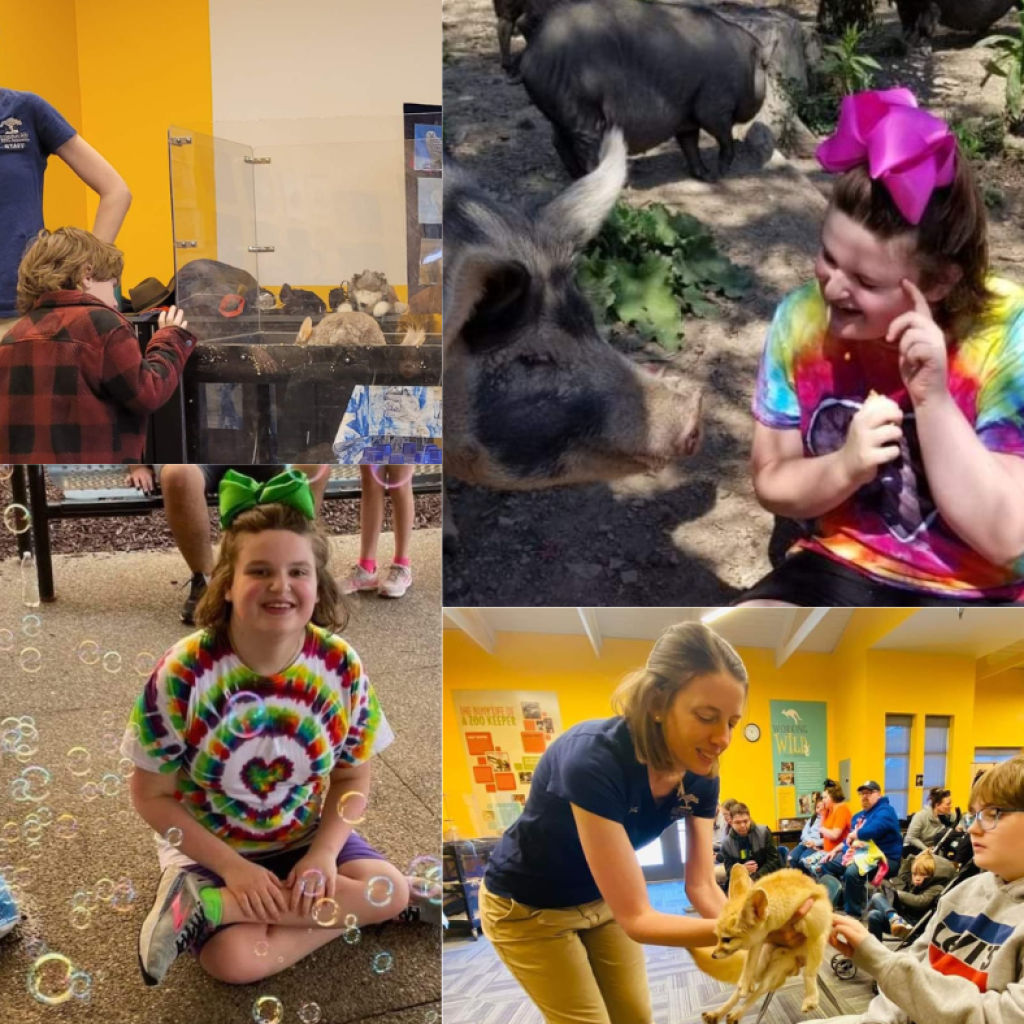
Sophie’s Potluck Zoo Encounter
Are there opportunities to volunteer?
Are there opportunities to host events?
Any ideas or advice for parents and caregivers with autistic loved ones?
Showing Love through Multiple Connections
- Are you a past or present board member, founder, paid professional, community partner, or a generous volunteer who has supported the autism community via Autism Connection?
- Could you be one of the seasoned folks who knew us as the original “ABOARD” – or Advisory Board on Autism and Related Disorders – who got this “party” started?
- Are you one of our supportive friends at ACHIEVA, a foundation giver, an individual donor, someone from the corporate world who has decided to sponsor us, or a phenomenal community group who has fundraised for us?
- Could you be a researcher friend, a compassionate judge, or a public servant we call on at all hours with questions or emergency situations needing attention?
- Are you a family member or autistic friend who chooses us for support, or who works as our colleague? Or a marathon runner, or a personal friend or family member who supports our work?
Love Takes Many Forms
“agape
Original Greek: ἀγάπη (agápē)
Agape is often defined as unconditional, sacrificial love. Agape is the kind of love that is felt by a person willing to do anything for another, including sacrificing themselves, without expecting anything in return. Philosophically, agape has also been defined as the selfless love that a person feels for strangers and humanity as a whole.”
What Brings Our Thoughts to Love
Here’s why I’m thinking so hard about this now. Today we received our third request to cite a blog post – this one from Community Circles Restorative Justice Society (CCRJS) based in Ladysmith, British Columbia. Another was a request from Assets High School in Honolulu, Hawaii, and Cerebral Palsy Guidance in Syracuse, New York reached out to collaborate on bringing awareness of dual diagnosis of autism and cerebral palsy for a campaign in March (stay tuned).
This made me consider how we got here. And the logic chain goes like this: Tammi wrote the blog post cited today, found on our website that is funded by givers, the optimization of which was prioritized by our Strategic Plan originally written 12 years ago by board members (some of whom are family members or autistic people), shared by our community partners and friends online, maximizing our visibility so people in British Columbia could find, read, and use our words to benefit others we will never meet. Phew! It was not hard to make that list because I often reflect on our roots and the huge crowd that has the autism community’s “back”, and it is all true.
Love is in The Air
I’m going to close this because I really need to hit “stop” on John Paul Young who’s been playing on repeat as I write this, permanently etching these lyrics into my brain for the foreseeable future.
In the spirit of “sharing is caring”, here’s your earworm for today, with apologies to literal and visual thinkers for using that term. It’s okay if this is stuck in your head too – Here are those words for you to ponder.

